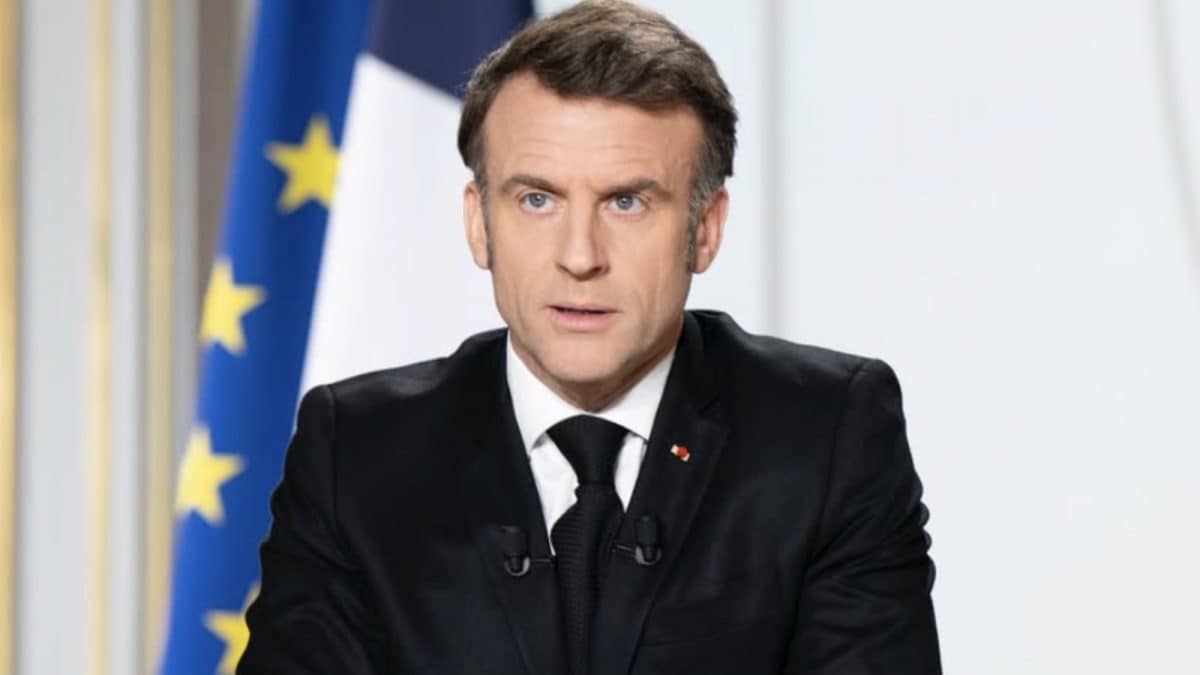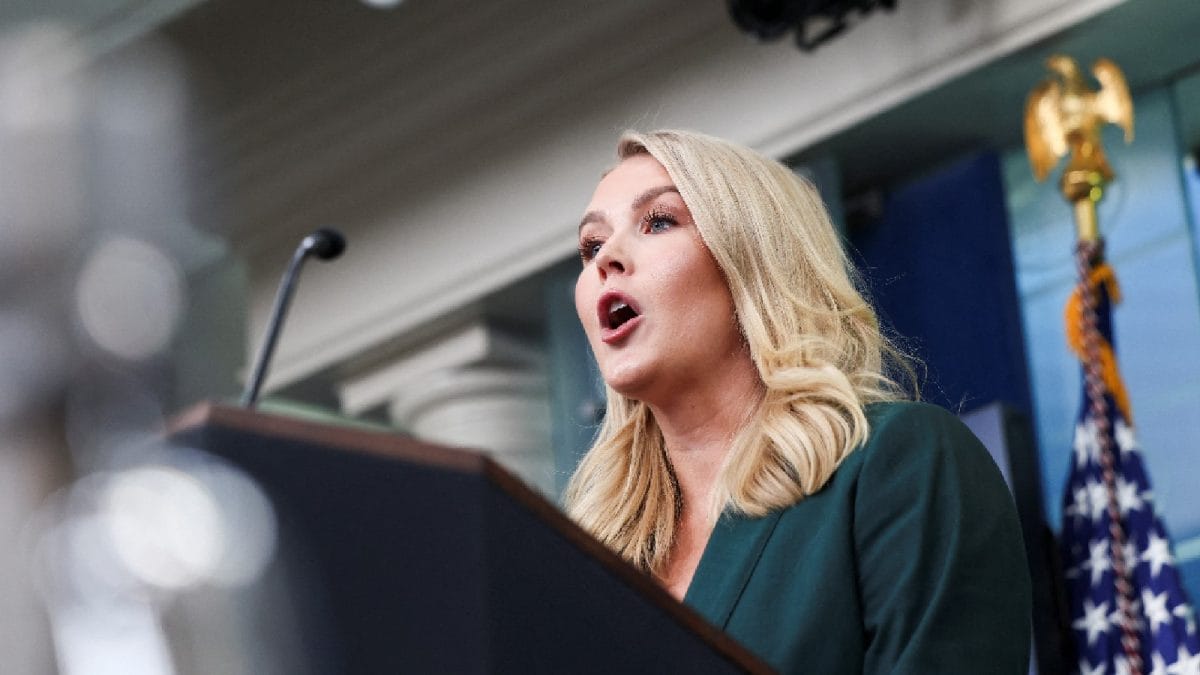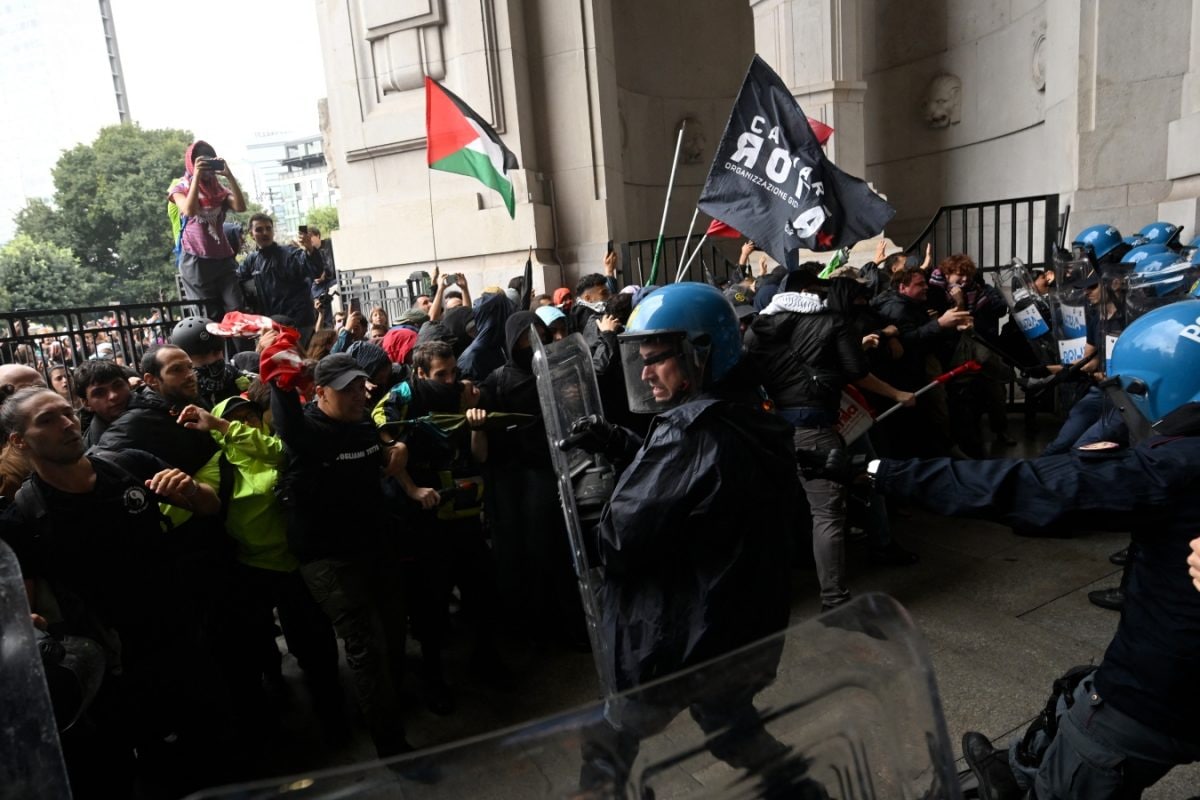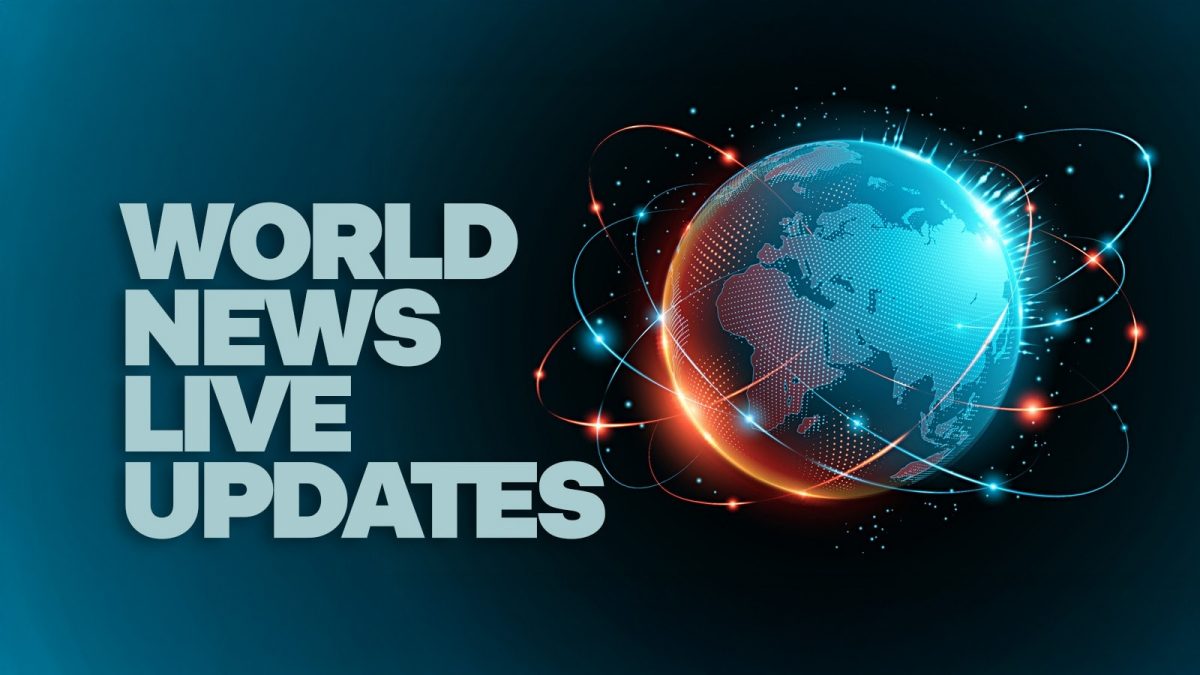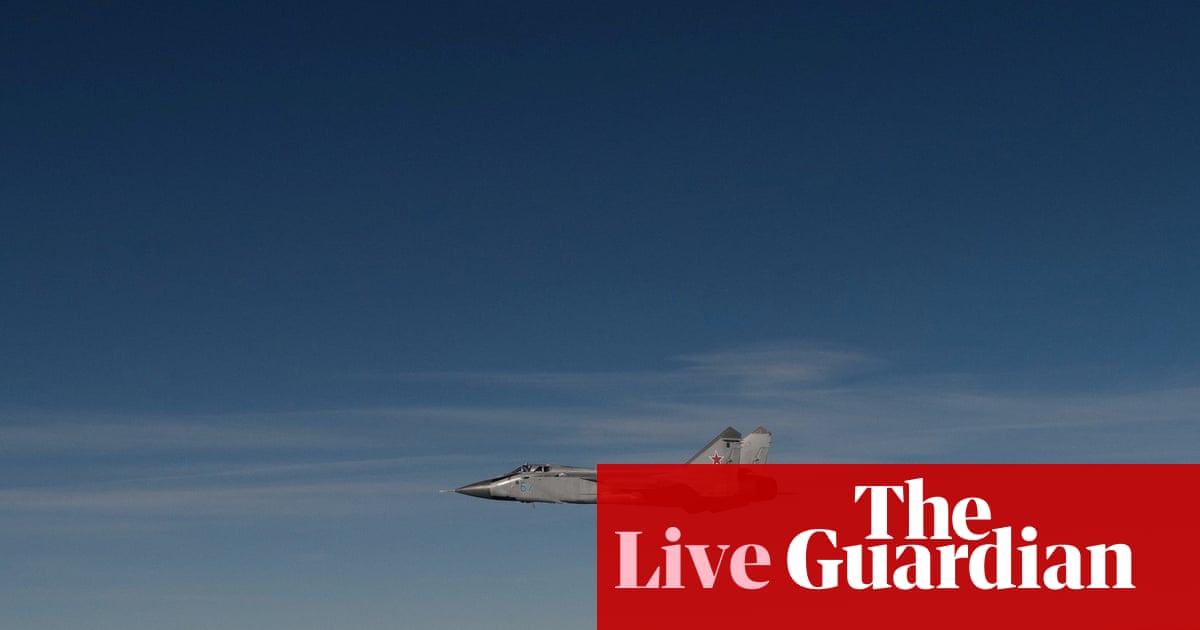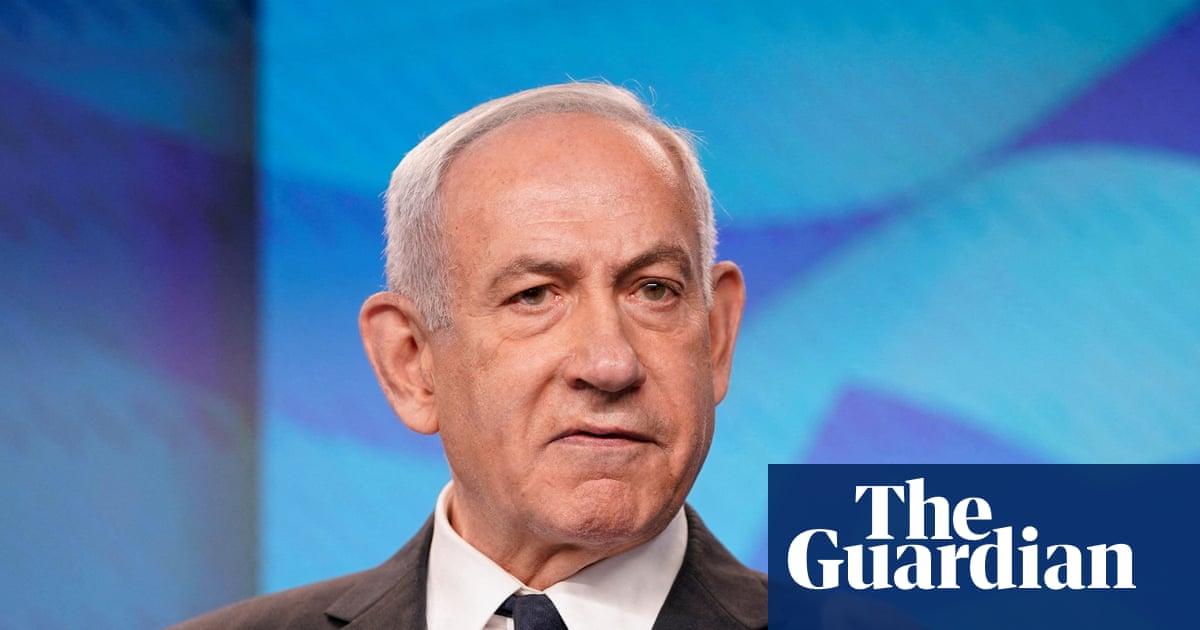European officials warn Israel over West Bank annexation plans following moves towards recognition
We are restarting our live coverage of Israel’s war on Gaza and the diplomacy around it.
European officials have reportedly warned Israel not to annex parts of the occupied West Bank in retaliation for western countries recognition of Palestinian statehood.
The UK, Australia and Canada all formally recognised Palestinian statehood on Sunday, in a historic move that put three major US allies at odds with the Trump administration and drew an immediate, angry response from Israel.
Portugal also recognised Palestine yesterday, and France is among the European countries expected to do the same at the UN general assembly in New York this week.
Israeli prime minister, Benjamin Netanyahu, said yesterday that recognition rewarded Hamas’ terrorism and said “we doubled Jewish settlement in Judea and Samaria (the West Bank) and we will continue on this path”.
The Israeli far-right finance minister, Bezalel Smotrich, and Itamar Ben-Gvir, the far-right national security minister, called for wholesale annexation of the occupied West Bank in response to the declarations.
“The days when Britain and other countries would determine our future are over … The only response to this anti-Israeli move is sovereignty over the historic homeland of the Jewish people in Judea and Samaria, and permanently removing the folly of a Palestinian state from the agenda,” Smotrich wrote on X.
The UK’s foreign secretary, Yvette Cooper, has told the BBC that she has warned Israel not to annex parts of the West Bank in response to the UK’s recognition of Palestinian statehood, which has particular historic significance given the UK’s role in the creation of Israel after the second world war.
Cooper said:
We have been clear that this decision that we are taking is about the best way to respect the security for Israel as well as the security for Palestinians.
It’s about protecting peace and justice and crucially security for the Middle East and we will continue to work with everyone across the region in order to be able to do that.
Foreign Secretary Yvette Cooper says she has warned Israel not to annex parts of the West Bank in retaliation for the UK's recognition of Palestinian statehood.
She was speaking to the BBC before attending a conference at the United Nations in New Yorkhttps://t.co/PabfJxI3N2 pic.twitter.com/N6Cbr3VzJp
The UK is to recognise a Palestinian state based provisionally on 1967 borders, before Israel occupied the Gaza Strip and West Bank. It will also pave the way for full diplomatic relations, with the Palestinian head of mission, Husam Zomlot, likely to be upgraded to full ambassadorial status.
If Israel does carry out some form of annexation of the West Bank, European officials would consider restricting trade with settlements, imposing more sanctions on violent settlers, and formally adopt an advisory opinion issued last year by the UN’s international court of justice, which found Israel’s occupation to be in violation of international law, according to the Financial Times.
Key events Show key events only Please turn on JavaScript to use this feature

Jason Burke
Jason Burke, our international security correspondent, has explored how the wave of international recognitions of a Palestinian state has been received by politicians across the political divide in Israel and how Israel’s increasing isolation on the international stage may affect the government’s standing. Here is an extract of his story:
Israel’s prime minister, Benjamin Netanyahu, leads the most far-right government in Israel’s history and his coalition is in part dependent on the continuing support of extremist religious Zionist factions, which have a messianic vision of Israel’s destiny, and ultra-Orthodox religious parties.
Neither are likely to be influenced by international outrage at the conduct of the war in Gaza, where an Israeli offensive has killed more than 65,000 and devastated the territory, or the continued expansion of settlements in the occupied West Bank.
Nor are supporters of the more mainstream, rightwing Likud, which Netanyahu leads.
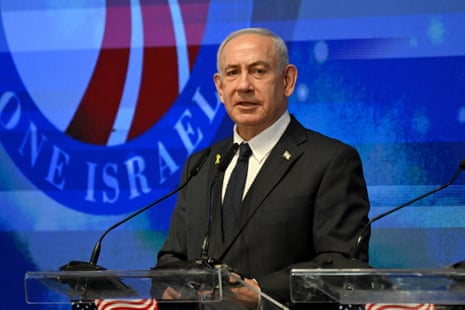
Gideon Rahat, a professor of political science at the Hebrew University of Jerusalem, said that in the short term at least Netanyahu and his allies would be strengthened by the “diplomatic tsunami”, as it has been called by local media, that Israel was facing.
“There are many people in Israel who are worried about international isolation, but most are not Netanyahu supporters and especially not his base,” said Rahat.
This may change, however, as isolation deepens, and could become a factor with politically significant centrist voters at elections, which have to be held before November next year.
Dr Shira Efron, distinguished Israel policy chair and senior fellow at the Rand Corporation, said that recognition was viewed in Israel as a “zero-sum game”.
“The view is that if you are for the self-determination of the Palestinians, you are necessarily against Israel,” she said. “The fear is that if it can happen in the UK or in France, then it can happen anywhere.”
As we mentioned in an earlier post, Palestine’s ambassador to the UK, Husam Zomlot, raised the Palestinian flag outside the Palestine mission building in London on Monday after the UK’s formal recognition of Palestine as a state, marking what he described as a “long overdue step”. Here is a video from a section of his speech:
Death toll from Israeli attacks on Gaza reaches 65,344 says health ministry
At least 65,344 Palestinian people have been killed and 166,795 others injured in Israeli attacks on Gaza since 7 October 2023, the Gaza health ministry said in a statement on Monday.
Over 61 Palestinian people were killed and 220 others injured in the last 24 hours alone, the ministry, whose figures are generally seen as reliable by the UN, said.
It added in its post on Telegram:
A number of victims are still under the rubble and on the streets, as ambulances and civil defence crews are unable to reach them at the moment.
Two hospitals in Gaza City shut down after intense Israeli bombardment
In an update posted to Telegram, Gaza’s health ministry said the al-Rantisi children’s hospital and the eye hospital in Gaza City are “out of service” due to the Israeli bombing of their surrounding areas.
The ministry said the al-Rantisi hospital was severely damaged after it was directly bombed a few days ago.
Air conditioning units, water tanks and solar panels are reported to have been severely damaged by Israeli attacks on the facility, which Medical Aid for Palestinians has said is the only specialist facility for children with cancer and kidney failure.
In its statement published on Telegram, Gaza’s health ministry said:
The occupation is deliberately and systematically targeting the health services system in the Gaza Strip as part of the genocide policy it is waging against the Strip.
All facilities and hospitals lack safe roads that enable patients and the wounded to reach them.
Patients and the wounded face extreme difficulty in reaching the Jordanian field hospital and al-Quds hospital as a result of the continuous bombing.
The ministry of health renews its call to all concerned parties to provide protection for health facilities and medical staff.
The attacks come amid the large-scale Israeli bombardment of Gaza City which is accompanying the IDF’s ground offensive launched last week in defiance of international opposition.
The city, already suffering from a catastrophic famine caused by Israel’s restrictions on aid, was under attack weeks before the offensive was officially declared.
If Israeli troops take over Gaza City, the entire 2.1 million population of the devastated territory will be confined to a small enclave in the south.

Patrick Wintour
Arab and Muslim leaders are to meet Donald Trump in New York to discuss their plan for a UN-mandated international stabilisation force in Gaza after France joined the UK, Canada and Australia in recognising Palestine as a state.
Israel has warned that it might respond to the recognition of Palestine by annexing the West Bank, citing claims from Hamas that recognition by allies of Israel was a victory for the terror group.
France has said the plan for a stabilisation force would marginalise Hamas by disarming the group and excluding it from power.
The proposal, which is due to be endorsed on Monday at a UN conference on Palestinian statehood, includes a UN-mandated force to provide security in Gaza as well as oversee the disarmament of Hamas and help train a Palestinian Authority (PA) police force.
The Arab League declared in July that Hamas must play no further role in governance, with power handed to a newly elected PA to govern Gaza, the West Bank and East Jerusalem. Hamas would be required to hand over its weapons to the authority.
The Trump meeting, scheduled after his address to the UN’s general assembly, is the most direct engagement between the White House and Arab states on post-ceasefire plans for Gaza since he was elected president for a second time.
Some French mayors have defied government orders and flown Palestinian flags on town halls, with more expected to follow suit as France prepares to formally recognise a Palestinian state at the United Nations General Assembly.
It’s unclear how many cities will join the initiative on Monday after Socialist leader Olivier Faure’s call to fly the flags despite warnings from the Interior Ministry against such displays in a country with both Europe’s largest Jewish and Muslim populations, AP reported.
But the call has been gaining momentum as Palestinian flags have been more and more visible in France over the nearly two-year war in Gaza.
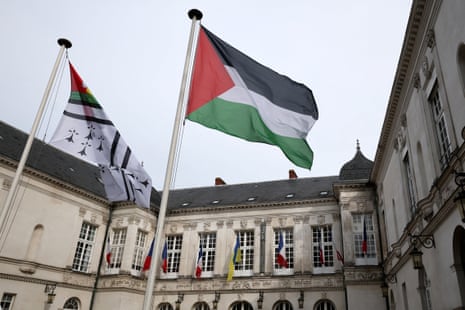
Palestinian banners were on display in demonstrations this week during a big day of protests across the country that criticised several polices by French president Emmanuel Macron and his government.
The Palestinian flag has been flying at the town hall of Malakoff, a suburb of Paris, since Friday. The city mayor, Jacqueline Belhomme, told the Associated Press on Sunday she was ordered to take it down but refused to comply.
“We stand with the Palestinian people; it is something symbolically important, just as we did some time ago with the Ukrainian flag when we stood with the Ukrainian people who were under attack by Russia.”
A Palestinian firefighter tries to extinguish fire at a residential building hit in an Israeli strike, amid an Israeli military operation, in Gaza City, earlier today.
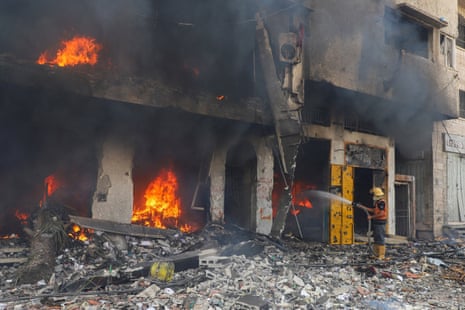
Scotland’s first minister has urged the UK government to “take further action” after recognising the Palestinian state.
John Swinney attended an event at the Palestinian Mission in London on Monday marking the decision, PA reported.
While he welcomed the decision, the first minister also urged the government to go further, including imposing sanctions on members of the Israeli government, pulling out of the free trade deal with the country and ending all military cooperation with Israel.
Also calling for the UK to join South Africa’s case against Israel at the Court of Justice and commit to executing Criminal Court arrest warrants, the first minister said:
This is a historic moment for the people of Palestine which should have come long ago.
I have been clear that the UK’s recognition of the State of Palestine should have been unconditional, but this decision goes some way towards acknowledging the UK’s solemn and historic responsibility towards all peoples of the region.
While this announcement is welcome news, this is just the first step towards establishing the two-state solution.
I urge the UK government to take further action to accelerate peace including continuing to call for an immediate ceasefire and the resumption of free flowing aid.
The international community must use all its energy to persuade and pressurise Israel to end the violence and return to a peace process.
A two-state solution is the only option that can provide peace, prosperity and security for both the state of Palestine and the state of Israel.
Palestine’s ambassador to the UK, Husam Zomlot, has addressed a crowd in front of the Palestine Mission in central London during a special ceremony to mark its transition to becoming Palestine’s embassy in the country after the UK formally recognised Palestine as an independent state yesterday.
“We are gathered today in front of the Palestinian Mission to the UK here in London to mark a historic moment,” Zomlot said.
“In the same capital of the Balfour Declaration, after more than a century of ongoing denial, dispossession and erasure, the UK government has finally taken the long overdue step of recognising the state of Palestine,” he added.
The UK is to recognise a Palestinian state based provisionally on 1967 borders, before Israel occupied the Gaza Strip and West Bank. It will also pave the way for full diplomatic relations.
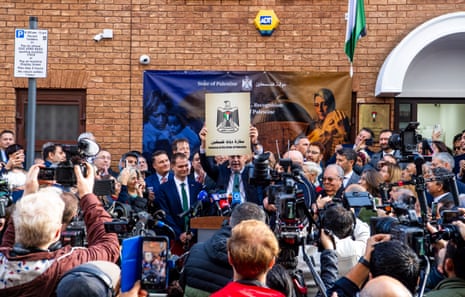
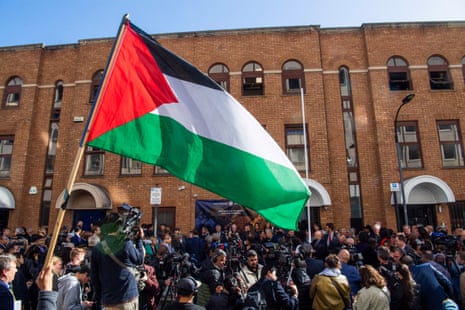
What do opponents of recognising Palestinian statehood say?
This snippet is from an explainer written by my colleagues Patrick Wintour and Archie Bland:
There are two different criticisms. Israel and the US claim that recognition is a reward for the Hamas attacks on 7 October 2023. Israel also claims the Palestinian Authority leadership is endemically corrupt, repressive and that the promise to hold elections has been repeatedly made, only to be deferred. They claim no partner for peace exists.
A second criticism is that the two-state solution has become a diplomatic fig leaf, and a relic of the past dating back to the 1993 Oslo accords that proposed a Palestinian state on 1967 borders.
These critics argue the emotions ingrained by 7 October mean support for the concept has drained away on both sides of the divide.
In a new book, Tomorrow is Yesterday, two veteran negotiators – Robert Malley and Hussein Agha – describe the two-state solution as a meaningless distraction and a performative notion used by diplomats for 30 years to avoid finding real solutions.
They say without practical steps to force Israel engage, “the offer of recognition won’t change the life of a single Palestinian”.
Israel reopens key border crossing with Jordan
The Allenby crossing, the only gateway between the Israeli-occupied West Bank and Jordan, has reopened, a spokesperson for the Israeli authority managing the land border said on Monday, according to Reuters.
Israel officially closed the crossing on 19 September, a day after a Jordanian truck driver opened fire there, killing two Israeli soldiers.
The border crossing is also the main route for transporting commercial goods between Jordan and the West Bank.
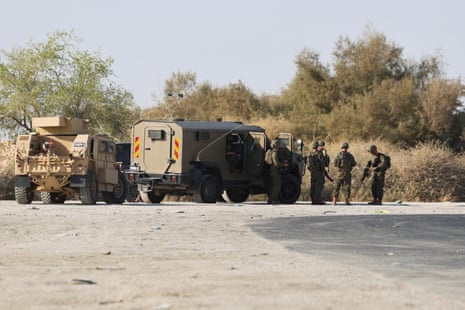
Two leading human rights organisations based in Israel, B’Tselem and Physicians for Human Rights, have also said Israel is committing genocide against Palestinians in Gaza.
Spanish prime minister Pedro Sánchez, the EU’s former foreign policy chief Josep Borrell, and Amnesty are among others who have said the same thing.
The UN investigators cited examples of the scale of the Israeli killings, aid blockages, forced displacement and the destruction of a fertility clinic to back up its genocide finding.
The 1948 UN Genocide Convention defines genocide as crimes committed “with intent to destroy, in whole or in part, a national, ethnic, racial or religious group, as such”. To count as genocide, at least one of five acts must have occurred.
The UN commission found that Israel had committed four of them: killing; causing serious bodily or mental harm; deliberately inflicting conditions of life calculated to bring about the destruction of the Palestinians in whole or in part; and imposing measures intended to prevent births.
It cited as evidence interviews with victims, witnesses, doctors, verified open-source documents and satellite imagery analysis compiled since the war began two years ago.
Israel is fighting allegations at the world’s top court, the international court of justice, of committing genocide in Gaza. Israel has denied the claims.
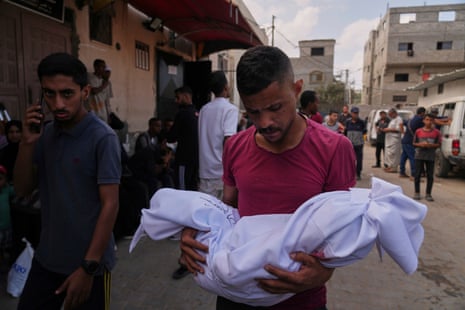
UN investigators said last week they had determined that Israel has committed “genocide” in Gaza since October 2023, with the “intent to destroy the Palestinians” in the territory.
The United Nations independent international commission of inquiry (COI), which does not speak on behalf of the UN, found that “genocide is occurring in Gaza and is continuing to occur”, said its head, Navi Pillay.
“When clear signs and evidence of genocide emerge, the absence of action to stop it amounts to complicity,” she added. “All states are under a legal obligation to use all means that are reasonably available to them to stop the genocide in Gaza.”
The report concluded that Israel’s prime minister, Benjamin Netanyahu, as well as its president, Isaac Herzog, and the former defence minister Yoav Gallant, had “incited the commission of genocide” and that Israeli authorities had “failed to take action against them to punish” this incitement.
Israel’s ambassador to the UN in Geneva, Daniel Meron, called the report a scandalous and fake “libellous rant” that had been authored by “Hamas proxies”.
Italian cities see protests, strikes and blockades against Israel's 'genocide' in Gaza
Cities across Italy on Monday saw pro-Palestinian protests, strikes and blockades responding to calls from unions to “denounce the genocide in Gaza” and for diplomatic and economic sanctions against Israel.
In Rome, hundreds of high school students gathered outside Termini train station, while there were also protests in northern cities Milan and Turin, the central city Florence and southern cities Naples, Bari and Palermo.
Dockworkers in Genoa and Livorno in the centre-north blocked the ports, according to reports. Italian dockworkers say they are seeking to prevent Italy from being used as a staging post for the transfer of arms and other supplies to Israel.
In Rome, the Italian capital, many buses were not running and the metro service was disrupted, reporters from the Agence France-Presse news agency said.
Italy’s prime minister, Giorgia Meloni, whose government is ideologically close to Donald Trump, has repeatedly voiced her “concern” over Israel’s war but reportedly does not plan on recognising a Palestinian state right now.
Rome has also expressed reluctance about implementing the EU’s proposed trade sanctions on Israel.

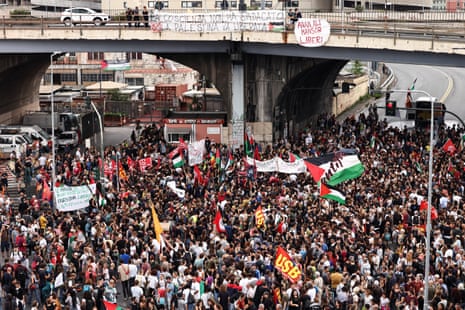
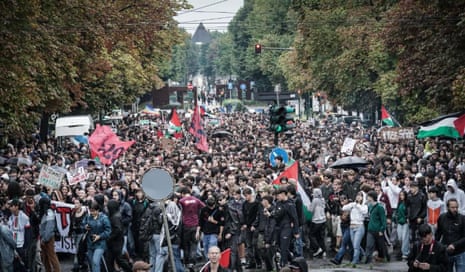
Malta to announce formal recognition of Palestinian state later today
Malta will announce its formal recognition of a Palestinian state at the UN general assembly in New York on Monday, the prime minister’s office said.
The Mediterranean EU island has a history of support for Palestinian causes and has backed efforts for a two-state solution, while maintaining diplomatic relations with Israel.
Malta’s prime minister, Robert Abela, first announced plans for the recognition of a Palestinian state in May, but the UN conference was postponed to a later date.

 6 hours ago
6 hours ago



